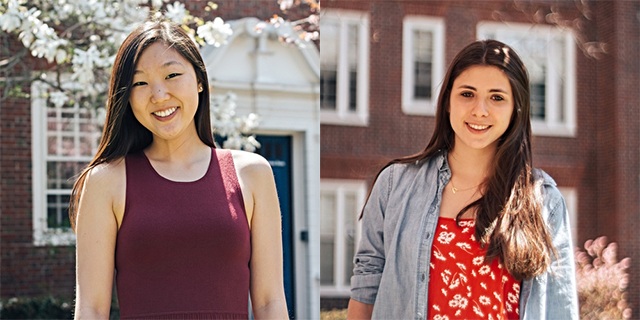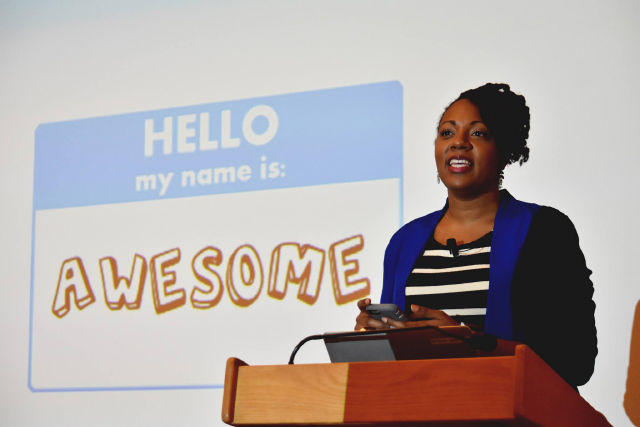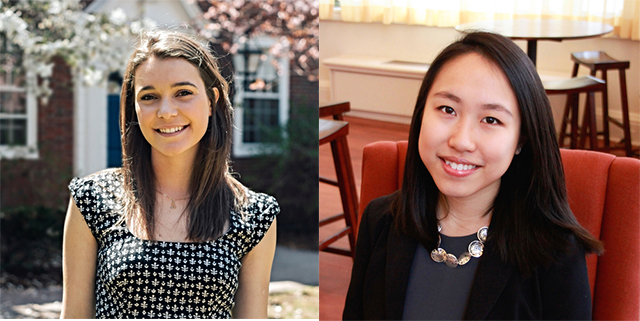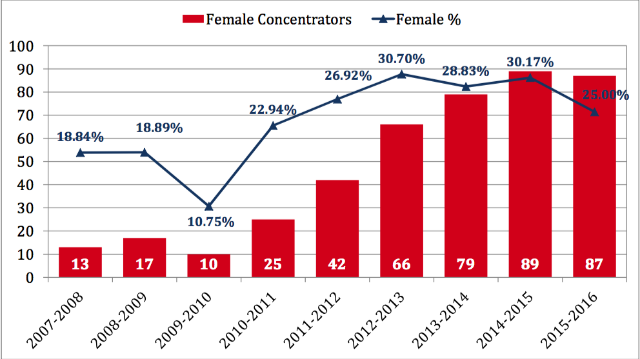News
More than 600 women from universities across the country attended the third annual WECode Conference in February. (Photo courtesy of Harvard Women in Computer Science.)
Midway through her sophomore year, Hana Kim, A.B. ’16, nearly threw in the towel and gave up on her computer science concentration. Kim, who had no background in programming, felt isolated and overwhelmed in classes where it seemed like everyone knew more about computer science than she did.
In desperation, she reached out to the Harvard John A. Paulson School of Engineering and Applied Sciences (SEAS) student group Women in Computer Science (WICS). Through WICS, not only did Kim receive the academic boost she needed, she also found support from other women preparing to enter a profession that remains male-dominated. Kim now shares that sense of encouragement with her peers as WICS co-president.
“I chose to continue with computer science and ended up absolutely loving it, but I almost dropped the concentration out of fear. I never want someone to give up on CS for that reason. I don’t want anyone to give up because they don’t feel they belong or they don’t feel comfortable,” she said.
Kim and co-president Michelle Danoff, A.B. ’16, see WICS as a way to make the computer science environment more welcoming for women of all backgrounds. Whether reaching out to freshman who are contemplating a computer science concentration or seniors preparing to enter the workforce, WICS sends a powerful message to its members: you are not alone.

Seniors Hana Kim (left) and Michelle Danoff serve as co-presidents of WICS. (Photo courtesy of Harvard Women in Computer Science.)
Danoff and Kim are in good company at SEAS. More than 25 percent of computer science concentrators are female, up from 18 percent when the school was founded in 2007. Although the number of female concentrators more than doubled since WICS launched five years ago, there is still work to be done, Danoff said. Nationwide, women earned only 18 percent of undergraduate computer science degrees, according to the National Science Foundation.
“I’ve seen friends make certain choices because they felt uncomfortable being the only girl in the room,” she said. “We want to provide paths for women to achieve success in computer science.”
WICS pairs younger students with older peers who provide support, advice, and encouragement. The organization also hosts tech talks, career information sessions, recruiting events, and technical workshops to help members succeed in their computer science classes.
The organization’s work is outward-facing, too, especially through the annual WECode Conference. The conference, held for the third time in February, brought together about 600 students from different universities for two days of computer science lectures, workshops, and networking opportunities.

Cathyrn Posey, director of strategic partnerships and alliances for the White House United States Digital Service, speaks during the WECode conference. (Photo courtesy of Harvard Women in Computer Science.)
The conference has grown dramatically each year, with programming evolving to reflect changes in the industry and the interests and needs of participants, explained WECode co-chair Abigail Orlando, A.B. ’17. This year’s conference featured an Innovation Challenge in which teams of entrepreneurs pitched business ideas to a panel of judges from venture capital firms, non-profits, and startups.
“Tech entrepreneurship can be a very intimidating environment for women,” Orlando said. “One of our goals was to instill in all attendees a sense of the talents they have to offer and a deep faith in their ability to make an impact.”
Fostering a feeling of inclusivity is especially important for conference attendees who hail from universities that lack a strong mentoring organization for women in computer science, explained WECode co-chair Billie Wei, A.B. ’17.
By expanding their network of campus ambassadors, Harvard WICS can play a major role in changing the perception of women in computer science on a national level, she said.
“I hope that the women who attended WECode went back to their campuses with a stronger network and some new friendships. But even more than that, I hope that they are inspired to get involved in some kind of advocacy effort at their own schools,” Wei said.

Abigail Orlando (left) and Billie Wei led the planning of this year's WECode Conference. (Photo courtesy of Harvard Women in Computer Science.)
And while women may be the central focus, WICS is a computer science advocacy organization, Danoff explained. The club counts men among its members, and some have become actively involved on the WICS board. The organization also advocates for minority computer science students of both genders.
“We believe that gender diversity in the field of computer science will benefit everyone, not just women,” Danoff said. “Lack of parity is a diversity problem, not only a women’s problem.”
The organization, which now has more than 300 members, receives strong support from computer science faculty at Harvard and has begun to serve as a model for new WICS programs at other universities.

This graph shows the number and percentage of female computer science concentrators since SEAS was founded in 2007.
“I’ve never seen a campus organization have as pervasive an impact as WICS has had,” said faculty advisor Margo Seltzer, Herschel Smith Professor of Computer Science. “The founders built a sustainable infrastructure, and the organization has had a phenomenal collection of board members who carry the vision forward and broaden WICS’ scope. There is more work to be done, but I am confident that WICS will continue to have a huge impact on computer science at Harvard and elsewhere for a long time to come.”
The broadening reach of Harvard WICS showcases how some of the entrenched computer science stereotypes are starting to crumble, Danoff said.
“We are at this incredible moment where everyone is on the same page. Students, universities, and companies all want to see more women in tech,” Kim said. “We are really hoping that this isn’t just a fad, that we’re not just the ‘cause of the moment.’ We want all this support we’ve received and all the momentum to keep building until we achieve parity.”
Click here to watch videos of the WECode Conference speakers.
WECode 2016 Lightning Talk with Jenny Li (Goldman Sachs)
Jenny Li of Goldman Sachs gives a lightning talk at the WECode Conference.
Cutting-edge science delivered direct to your inbox.
Join the Harvard SEAS mailing list.
Press Contact
Adam Zewe | 617-496-5878 | azewe@seas.harvard.edu
